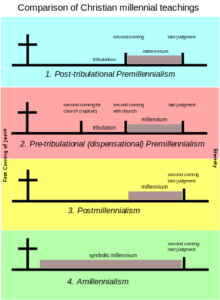 The concept that “God is perfect” was borrowed by the church from Greek philosophy in the 2nd and 3rd centuries as the number of non-Jewish background believers increased. During this time the followers of the Jesus were subject to various persecutions by the officials of the Roman Empire. Church leaders sought to defend the Christian faith from those who persecuted them by using the same philosophical tools their enemies were using. Hence these church leaders adopted and built upon some of concept first promoted by Plato, Aristotle and others.
The concept that “God is perfect” was borrowed by the church from Greek philosophy in the 2nd and 3rd centuries as the number of non-Jewish background believers increased. During this time the followers of the Jesus were subject to various persecutions by the officials of the Roman Empire. Church leaders sought to defend the Christian faith from those who persecuted them by using the same philosophical tools their enemies were using. Hence these church leaders adopted and built upon some of concept first promoted by Plato, Aristotle and others.
The idea that the divine has to be perfect comes from Plato who argued since the gods were the best in virtue and beauty, they could not change as changing would mean that they were not the best or perfect. A few church leaders picked upon Plato’s concepts of divine perfection and connected it to the God of the Scriptures. (As a side note, it is worth noting that Plato was responding to Heraclitus who thought that everything was in a constant state of change.)
The crazy thing is that the Hebrew Old Testament does not present the Creator as being perfect and unchanging, but rather good. God is good and it is his goodness that shines through in his interactions with humanity. The Psalms are full of statements along these lines (e.g. Psalm 100:5, Psalm 86:5). 1 Chronicles 16:34 is a famous example of the goodness of God: “O give thanks to the LORD, for He is good; For His lovingkindness is everlasting.”
The only verse that states that God is perfect is Matthew 5:48 where Jesus says, “You therefore must be perfect, as your heavenly Father is perfect.” The context of this verse and the root meaning of the Greek word (τέλειος) translated as “perfect” allows for one to read this verse as, “You therefore must be mature, complete in moral character, as your heavenly Father is mature.”
If anything is perfect it is the ways of God (e.g. 2 Samuel 22:31, Psalm 18:30, Deuteronomy 32:4). It must be pointed out at this point that the Hebrew (תָּמִים) word translated as “perfect” in English can also mean “complete” or “whole.” Hence one could say that God’s ways are “whole, complete, blameless, without blemish.”
The focus on God’s goodness allowed the Old Testament writers to talk about the times when God changed his mind (e.g. Jeremiah 26:3, Exodus 32:14). Accordingly, under this mindset we see a good God who is willing to work with humanity in fulfilling his mission to redeem all of creation.
In saying that God changes his mind, folks will normally point to Malachi 3:6 (“I am Jehovah; I do not change”) and James 1:17 (“[God] does not vary or change like the shifting shadows.” My response would be to say that the nature of who God is does not change. He is good, he is loving, he is kind, he is merciful, and he will fulfill his promises. We do not need to worry about him giving up on us or throwing us to the side as a piece of trash as so many humans do to others.
Within Christianity there are streams of theology that are built upon the philosophical concept that God is “perfect” and “unchanging.” These traditions tend to focus on the holiness of God and how he has to keep his distance from the sinful and less-than perfect humans. To have or to be near a blemish is to have one’s perfectionism questioned, which cannot be allowed to happen because God is unchanging, holy, perfect, etc.
Other traditions use the goodness of God as their foundation. These traditions tend to see a Creator God who passionately pursues humanity even into the depths of sin so that he might redeem them. Though God is holy and blameless, he is not afraid of walking into the valley of death as he knows that sin and evil must flee from his presence.
Both groups, by the way, agree that the only way humanity is to be restored in relationship with God is through Jesus the Messiah. This is an open-handed issue that does not affect one’s position before God. Rather this is philosophical question about how we see and understand God. There have been great thinkers and awesome Jesus followers on both sides of the question of God being perfect or good.
Personally I fall on the side of focusing on the goodness of God as that is the God that I most readily see revealed in the person of Jesus. It also seems to be overwhelming view of God at display in the Old Testament. But there are those who disagree with me on this focus, and that is okay. 🙂
“Taste and see that the Lord is good; blessed is the one who takes refuge in him.” (Psalms 34:8, NIV)



 There are times when things that we should know about are lost in the avalanche of information that surrounds us each day. The stories of what happened to – and what is happening to – the Palestinian Christians is something that we should know more about. Sadly most of American Protestant Christianity has bought into a theological system that rejects these followers of Jesus while embracing the secular state of Israel.
There are times when things that we should know about are lost in the avalanche of information that surrounds us each day. The stories of what happened to – and what is happening to – the Palestinian Christians is something that we should know more about. Sadly most of American Protestant Christianity has bought into a theological system that rejects these followers of Jesus while embracing the secular state of Israel.
 There is a lot of talk these days about the symbols of the Confederacy. As a southern born and raised follower of Jesus, I thought I would add my voice to the conversation. As dangerous as that might be…
There is a lot of talk these days about the symbols of the Confederacy. As a southern born and raised follower of Jesus, I thought I would add my voice to the conversation. As dangerous as that might be…
 Barna Group released a study yesterday
Barna Group released a study yesterday